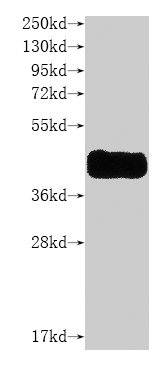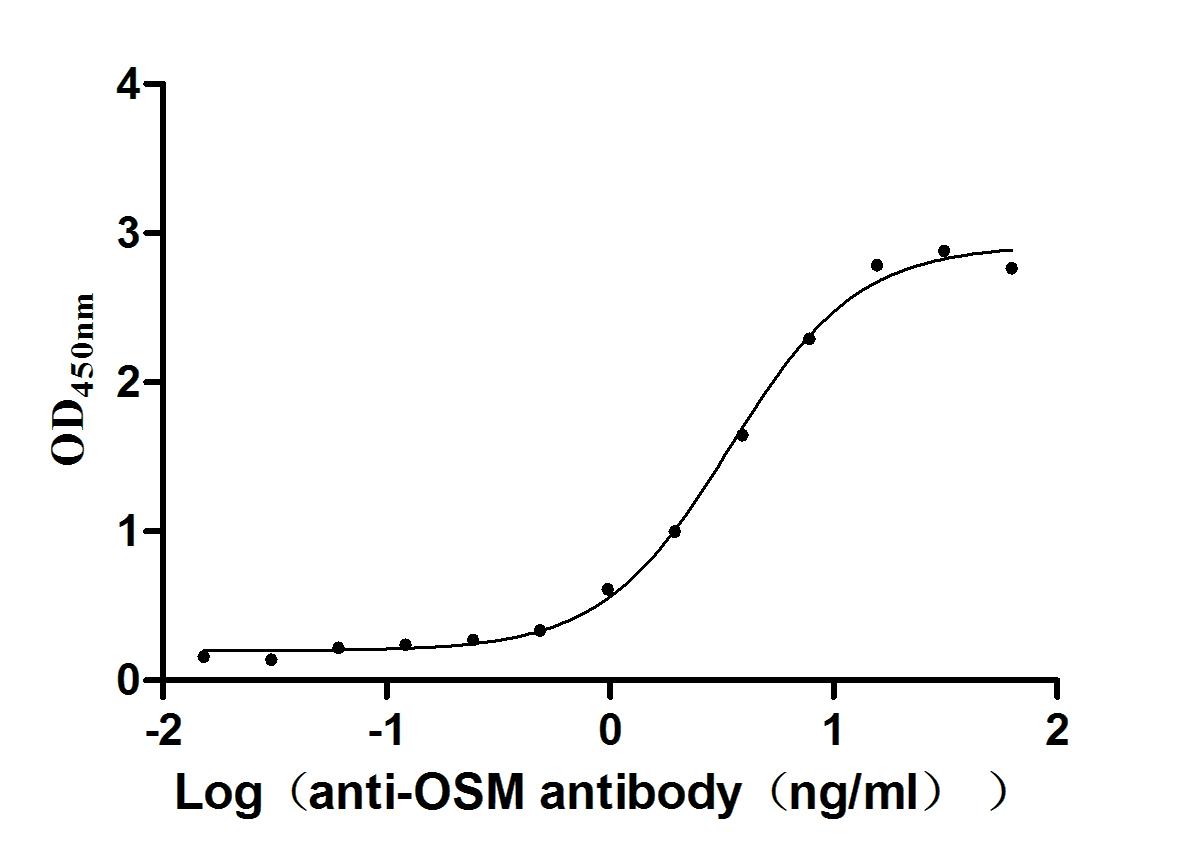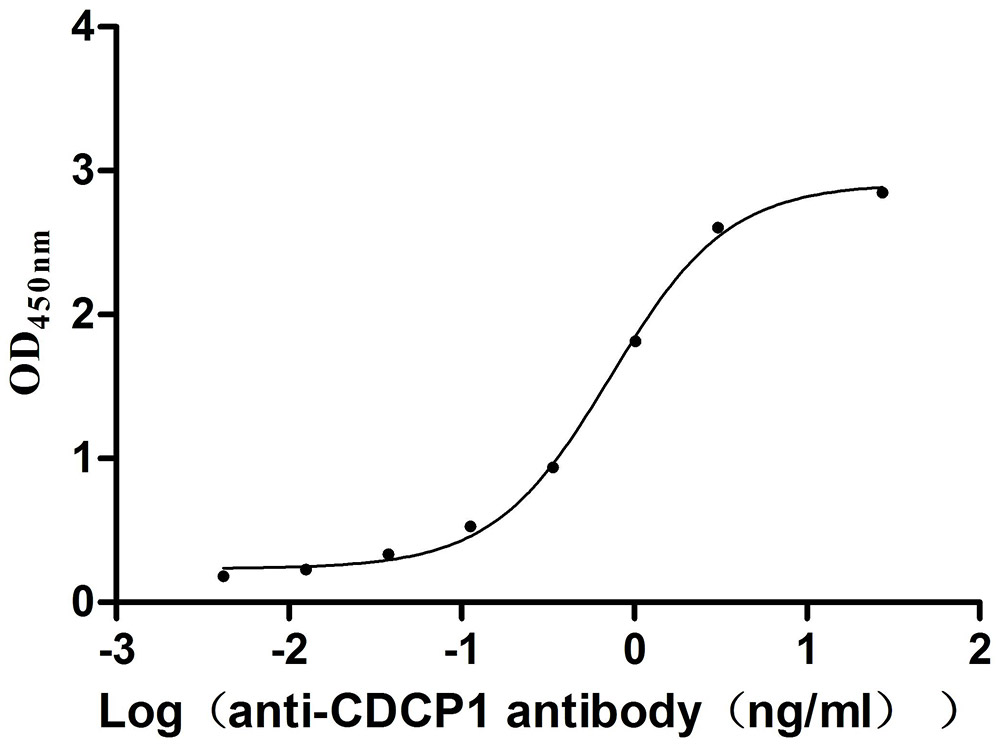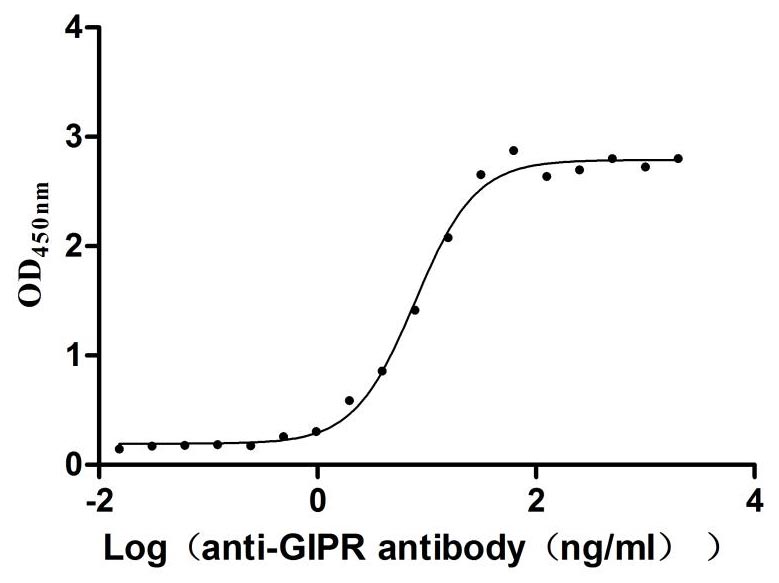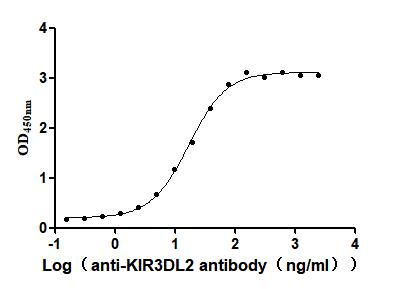Recombinant Mouse Heat shock factor protein 1 (Hsf1)
-
中文名称:小鼠Hsf1重组蛋白
-
货号:CSB-YP010791MO
-
规格:
-
来源:Yeast
-
其他:
-
中文名称:小鼠Hsf1重组蛋白
-
货号:CSB-EP010791MO
-
规格:
-
来源:E.coli
-
其他:
-
中文名称:小鼠Hsf1重组蛋白
-
货号:CSB-EP010791MO-B
-
规格:
-
来源:E.coli
-
共轭:Avi-tag Biotinylated
E. coli biotin ligase (BirA) is highly specific in covalently attaching biotin to the 15 amino acid AviTag peptide. This recombinant protein was biotinylated in vivo by AviTag-BirA technology, which method is BriA catalyzes amide linkage between the biotin and the specific lysine of the AviTag.
-
其他:
-
中文名称:小鼠Hsf1重组蛋白
-
货号:CSB-BP010791MO
-
规格:
-
来源:Baculovirus
-
其他:
-
中文名称:小鼠Hsf1重组蛋白
-
货号:CSB-MP010791MO
-
规格:
-
来源:Mammalian cell
-
其他:
产品详情
-
纯度:>85% (SDS-PAGE)
-
基因名:Hsf1
-
Uniprot No.:
-
别名:Hsf1; Heat shock factor protein 1; HSF 1; Heat shock transcription factor 1; HSTF 1
-
种属:Mus musculus (Mouse)
-
蛋白长度:Full length protein
-
表达区域:1-525
-
氨基酸序列MDLAVGPGAA GPSNVPAFLT KLWTLVSDPD TDALICWSPS GNSFHVFDQG QFAKEVLPKY FKHNNMASFV RQLNMYGFRK VVHIEQGGLV KPERDDTEFQ HPCFLRGQEQ LLENIKRKVT SVSTLKSEDI KIRQDSVTRL LTDVQLMKGK QECMDSKLLA MKHENEALWR EVASLRQKHA QQQKVVNKLI QFLISLVQSN RILGVKRKIP LMLSDSNSAH SVPKYGRQYS LEHVHGPGPY SAPSPAYSSS SLYSSDAVTS SGPIISDITE LAPTSPLASP GRSIDERPLS SSTLVRVKQE PPSPPHSPRV LEASPGRPSS MDTPLSPTAF IDSILRESEP TPAASNTAPM DTTGAQAPAL PTPSTPEKCL SVACLDKNEL SDHLDAMDSN LDNLQTMLTS HGFSVDTSAL LDLFSPSVTM PDMSLPDLDS SLASIQELLS PQEPPRPIEA ENSNPDSGKQ LVHYTAQPLF LLDPDAVDTG SSELPVLFEL GESSYFSEGD DYTDDPTISL LTGTEPHKAK DPTVS
-
蛋白标签:Tag type will be determined during the manufacturing process.
The tag type will be determined during production process. If you have specified tag type, please tell us and we will develop the specified tag preferentially. -
产品提供形式:Lyophilized powder
Note: We will preferentially ship the format that we have in stock, however, if you have any special requirement for the format, please remark your requirement when placing the order, we will prepare according to your demand. -
复溶:We recommend that this vial be briefly centrifuged prior to opening to bring the contents to the bottom. Please reconstitute protein in deionized sterile water to a concentration of 0.1-1.0 mg/mL.We recommend to add 5-50% of glycerol (final concentration) and aliquot for long-term storage at -20℃/-80℃. Our default final concentration of glycerol is 50%. Customers could use it as reference.
-
储存条件:Store at -20°C/-80°C upon receipt, aliquoting is necessary for mutiple use. Avoid repeated freeze-thaw cycles.
-
保质期:The shelf life is related to many factors, storage state, buffer ingredients, storage temperature and the stability of the protein itself.
Generally, the shelf life of liquid form is 6 months at -20°C/-80°C. The shelf life of lyophilized form is 12 months at -20°C/-80°C. -
货期:Delivery time may differ from different purchasing way or location, please kindly consult your local distributors for specific delivery time.Note: All of our proteins are default shipped with normal blue ice packs, if you request to ship with dry ice, please communicate with us in advance and extra fees will be charged.
-
注意事项:Repeated freezing and thawing is not recommended. Store working aliquots at 4°C for up to one week.
-
Datasheet :Please contact us to get it.
靶点详情
-
功能:Functions as a stress-inducible and DNA-binding transcription factor that plays a central role in the transcriptional activation of the heat shock response (HSR), leading to the expression of a large class of molecular chaperones heat shock proteins (HSPs) that protect cells from cellular insults' damage. In unstressed cells, is present in a HSP90-containing multichaperone complex that maintains it in a non-DNA-binding inactivated monomeric form. Upon exposure to heat and other stress stimuli, undergoes homotrimerization and activates HSP gene t...显示更多
-
基因功能参考文献:
- Variations in brain defects result from cellular mosaicism in the activation of Hsf1 heat shock signaling. PMID: 28462912
- Downregulation of miR-199b-5p induced differentiation of Bone-marrow mesenchymal stem cells toward cardiomyocyte-like cells partly via the HSF1/HSP70 signaling pathway. PMID: 29715263
- RIP140 is a co-repressor of HSF1, and it regulates neuronal stress response. PMID: 29233969
- These results provide new insight into HSF1 as a novel host factor for dengue virus infection through its role in facilitating autophagy-regulated viral replication in the brains. PMID: 28733114
- HSF1 activity is decreased in fibrotic hearts. HSF1 inhibits phosphorylation and nuclear distribution of Smad3 via direct binding to Smad3. Active Smad3 blocks the anti-fibrotic effect of HSF1. PMID: 28091697
- the expression level of NFATc2, miR-208b and miR-499 suggested that these responses were suppressed in HSF1-null mice PMID: 27084024
- HSF1 plays an important role in the occurrence of UVR-B-induced cataracts, possibly via regulation of HSPs such as HSP25. PMID: 27732059
- Targeted deletion of HSF1 results in changes of locomotor function associated with changes in cerebellar calbindin protein levels. These findings suggest a role of HSF1 in regular Purkinje cell calcium homeostasis. PMID: 27173427
- this study shows that HSF1 overexpression protects against TDP-43 pathology by upregulation of chaperones, especially HSP70, rather than enhancing autophagy PMID: 26994698
- Acetylation of the protein triggers TDP-43 pathology in cultured cells and mouse skeletal muscle, which can be cleared through an HSF1-dependent chaperone mechanism that disaggregates the protein. PMID: 28724966
- These findings provide insight into the role of HSF1 in Leydig cell steroidogenesis, suggesting that it maintains cholesterol transport by recovering StAR under chronic heat stress. PMID: 28575284
- In mammalian cell lines, only heat shock-induced but not basal expression of chaperones is dependent on the mammalian Hsf1 homolog. PMID: 27320198
- HSF1 translationally augments the proteotoxic stress response. PMID: 27043084
- HSF1 as a central regulator of cellular bioenergetics. PMID: 28183717
- have demonstrated that the levels of HSF1 and heat shock proteins are significantly reduced in affected neuronal tissues from a TDP-43 transgenic mouse model of amyotrophic lateral sclerosis and patients with sporadic amyotrophic lateral sclerosis. PMID: 26936937
- Role of HSF1 in heart failure.HSF1 up-regulation of AC6. PMID: 27643574
- Findings suggest that PGC1alpha protects against hyperthermia by cooperating with HSF1 in the induction of a transcriptional program devoted to the cellular protection from thermal insults. PMID: 26890141
- Heat stress-associated increase in skeletal muscle mass may be induced by heat shock transcription factor 1 (HSF1) and/or HSF1-mediated stress response that activates muscle satellite cells and Akt/p70S6K signalling pathway PMID: 26347147
- Defective Hsf1 inhibits the growth of fibrosarcoma derived from simian virus 40/T antigentransformed mouse embryonic fibroblasts. PMID: 26352782
- Suggest that the early activation of Hsf1 dependent cell stress pathway by mono-allelic mutations in APC can affect cell programming in a way that contributes to cancer onset. PMID: 26320184
- The pharmacological activation of HSF1 promotes thermogenic and mitochondrial gene programs in brown and beige cells and in skeletal muscle, with profound impact on metabolic parameters. PMID: 26344102
- HSF1 is required for myocardial fibrosis in ISO-treated mice, and the underlying molecular mechanism may involve the regulation of HSP47. PMID: 26239834
- It mediates maintenance of whole body homeostasis. PMID: 26251235
- s have concluded that at the physiological temperature HSF1 and HSF2 cooperate in spermatogenic cells. However, temperature elevation causes remodeling of chromatin binding and interactions between HSFs are disrupted. PMID: 25450459
- A novel regulatory mechanism between Hsf1 and Hsf4b in modulating lens epithelial cell homeostasis. PMID: 25601714
- Results show that the phosphorylation status of the regulatory domain (RD) does not affect the subcellular localization and DNA-binding activity of heat shock transcription factor 1 (HSF1). PMID: 25963659
- The expression of active HSF1 did not affect levels of epithelial-to-mesenchymal transition markers, it caused transcriptional down-regulation of vinculin, protein involved in cell motility, and adherence. PMID: 25435429
- HSF1 is directly regulated by TRiC/CCT, a central ATP-dependent chaperonin complex that folds cytosolic proteins. PMID: 25437552
- mutant p53 protein via direct interaction with activated p-Ser326 HSF1 facilitates HSF1 recruitment to its specific DNA-binding elements. PMID: 24763051
- FBXW7 modulates cellular stress response and metastatic potential through HSF1 post-translational modification. PMID: 25720964
- The genetic supplementation of SIRT1 can ameliorate a mutant SOD1-linked amyotrophic lateral sclerosis mouse model partly through the activation of the HSF1/HSP70i chaperone system. PMID: 25167838
- these findings uncover a novel interplay between the metabolic stress sensor AMPK and the proteotoxic stress sensor HSF1 that profoundly impacts stress resistance, proteostasis, and malignant growth. PMID: 25425574
- these results reveal that Hsf1 is a novel target of androgen receptor in mouse Sertoli cells, and testosterone and its receptor regulate the process of spermatogenesis partially by inhibiting Hsf1 expression. PMID: 24599545
- MLL1 functions as a coactivator of HSF1 in response to HSP90 inhibition PMID: 24831003
- after heat shock, HSF1gamma isoforms are exported from the nucleus more rapidly or degraded more quickly than HSF1alpha or HSF1beta PMID: 24855652
- These results, therefore, indicate that cellular stress can enhance osteoclast differentiation via Hsf1-dependent mechanisms and may significantly contribute to pathological and therapeutic related bone loss. PMID: 24692538
- HSF1 plays a crucial role in the response of brain cells to prenatal environmental insults. PMID: 24726381
- Inhibition of muscle hypertrophy might be attributed to the greater and prolonged enhancement of IL-6 expression. HSF1 and/or HSF1-mediated stress response may, in part, play a key role in loading-induced skeletal muscle hypertrophy. PMID: 24167582
- Heat shock factor 1 accelerates hepatocellular carcinoma development by activating nuclear factor-kappaB/mitogen-activated protein kinase. PMID: 24130164
- Hsf-1 affects podocyte markers NPHS1, NPHS2 and WT1 in a transgenic mouse model of TTRVal30Met-related amyloidosis. PMID: 23829269
- B cell and hematopoietic stem cell proliferation from HSF1(-) mice, but not HSF1(+) mice, were attenuated under stressful conditions, indicating that HSF1 is critical for the cell cycle progression of lymphoid cells activated under stressful conditions PMID: 24043900
- This comparative analysis with CRYAB and HSP70 demonstrates that differential heat shock response is controlled by cell-type-dependent access of HSF1 and HSF4 to specific promoters, independent of the promoter architecture. PMID: 23264262
- HSF1-dependent induction of cell death PMID: 23834426
- Decreased vitamin B12 availability induces ER stress through impaired SIRT1-deacetylation of HSF1. PMID: 23519122
- Results suggest that relative amounts of each heat shock factors HSF1 and HSF2 isoforms quantitatively determine the cellular level of the proteotoxic stress response. PMID: 23418516
- HSF 1 attenuates 3-nitropropionic acid -induced apoptotic striatal cell death and reactive oxygen species generation, possibly through HSP70 expression. PMID: 23225230
- Heat shock factor-1 influences the pathological lesion selectivity in spinal and bulbar muscular atrophy. PMID: 23360996
- Our results suggest that the balance between the cell survival and death signals mediated by HSP70 and TDAG51, respectively, may be disturbed by the altered expression of HSF1 during the progression of disease in this amyotropic lateral sclerosis model. PMID: 23063459
- Glutamine is an activator for both HSF1 expression and transactivation. PMID: 23055521
- Loss of the NF1 gene increased HSF1 levels and triggered its activation in mouse embryonic fibroblasts, making them tolerant to proteotoxic stress. Hsf1 deficiency impeded NF1-associated carcinogenesis by attenuating oncogenic RAS/MAPK signaling. PMID: 22945628
收起更多
-
亚细胞定位:Nucleus. Cytoplasm. Nucleus, nucleoplasm. Cytoplasm, perinuclear region. Cytoplasm, cytoskeleton, spindle pole. Cytoplasm, cytoskeleton, microtubule organizing center, centrosome. Chromosome, centromere, kinetochore.
-
蛋白家族:HSF family
-
数据库链接:
KEGG: mmu:15499
STRING: 10090.ENSMUSP00000072617
UniGene: Mm.347444


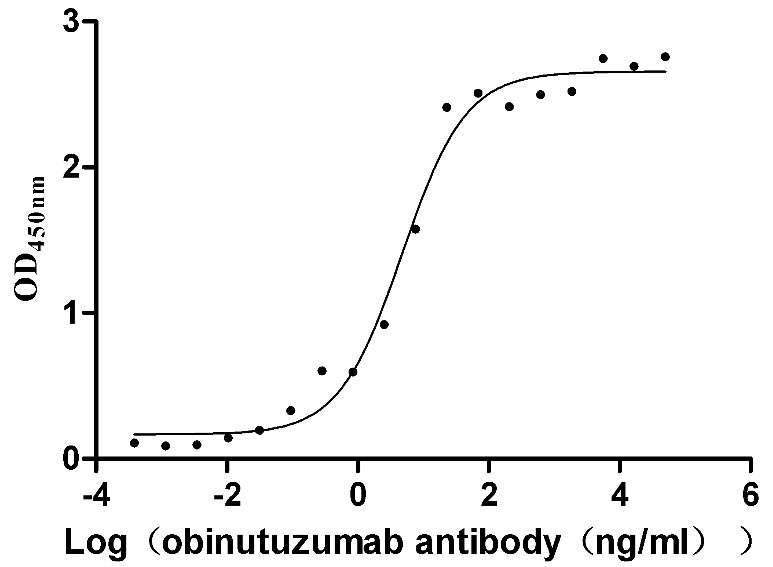
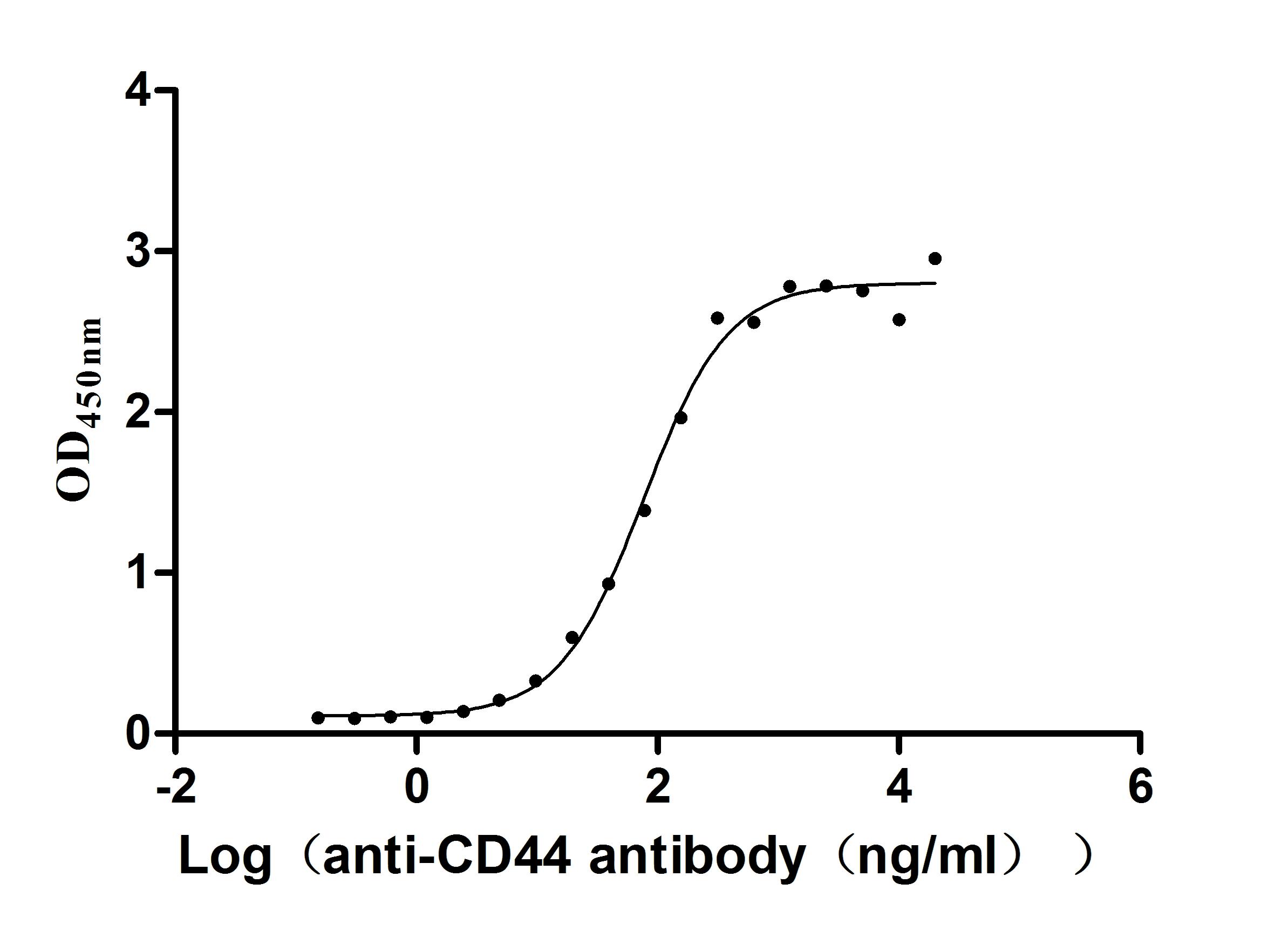
-AC1.jpg)
